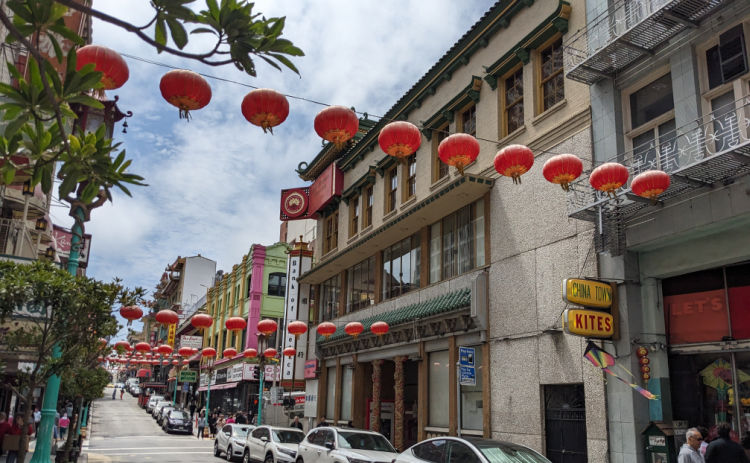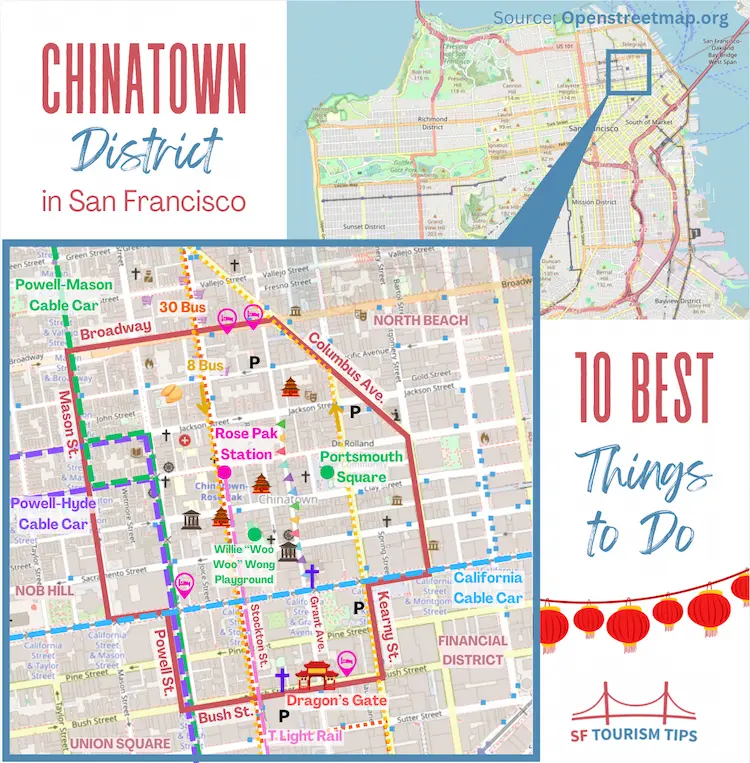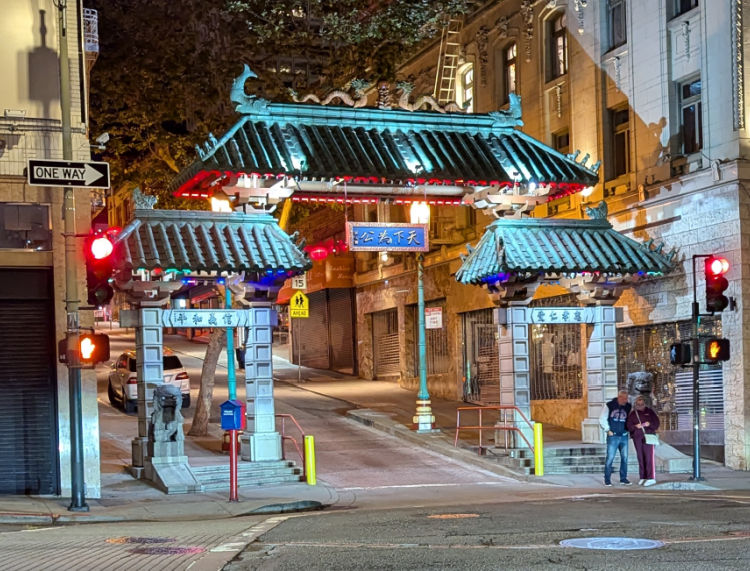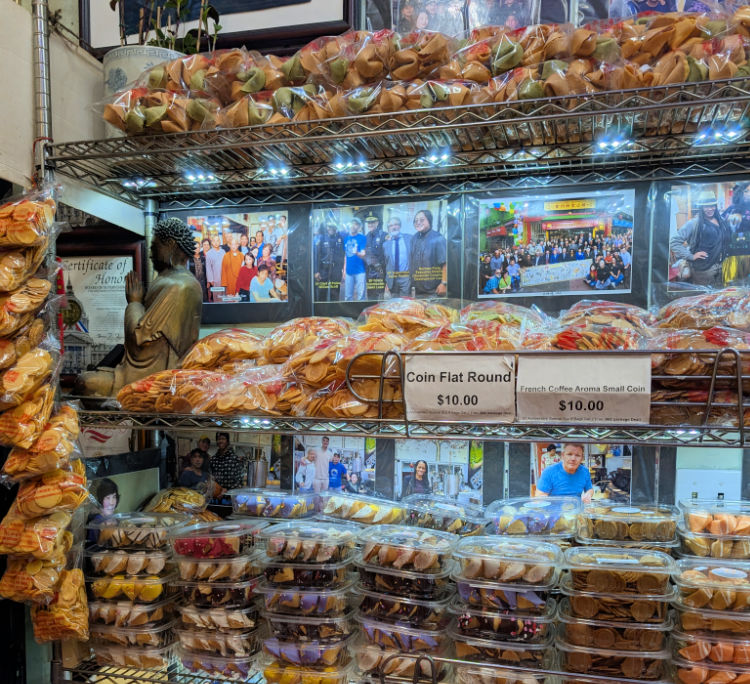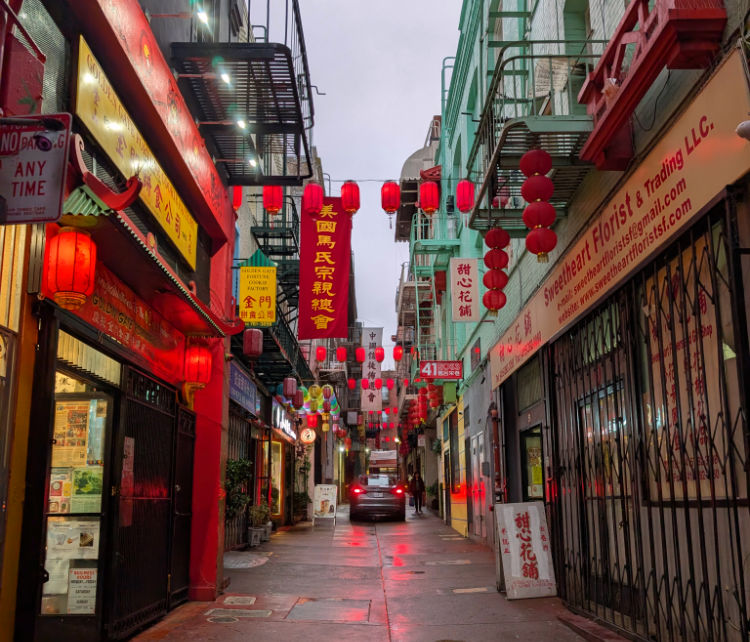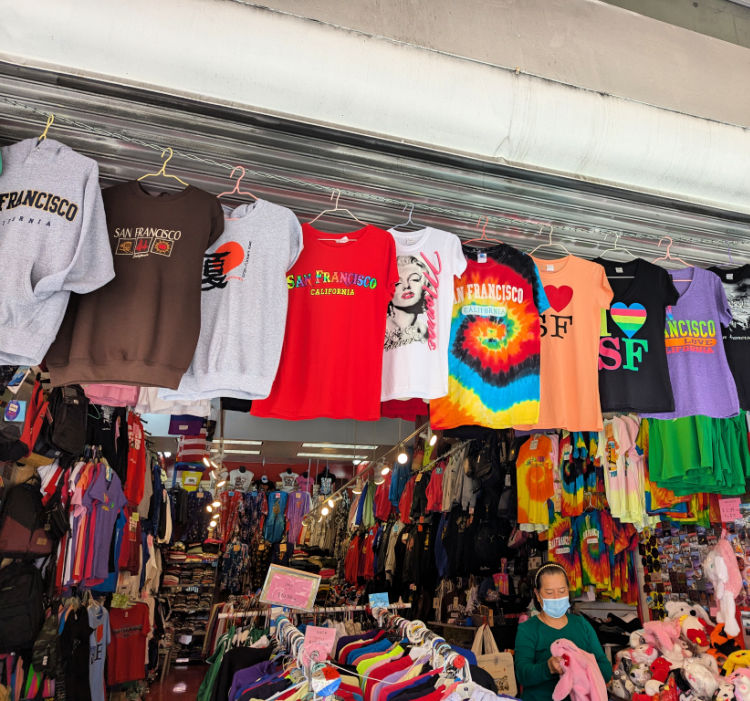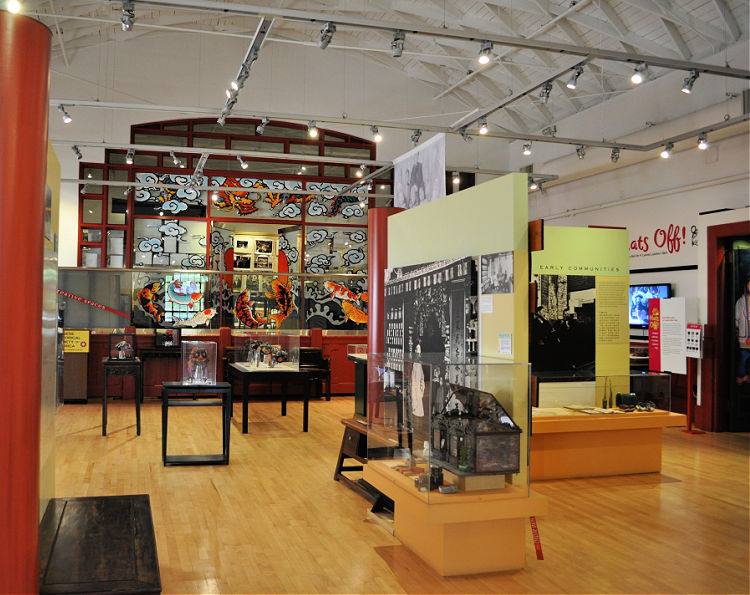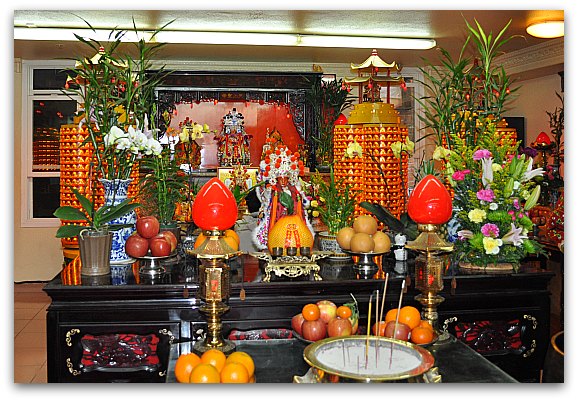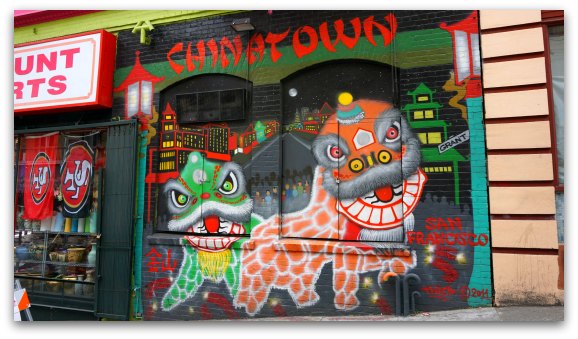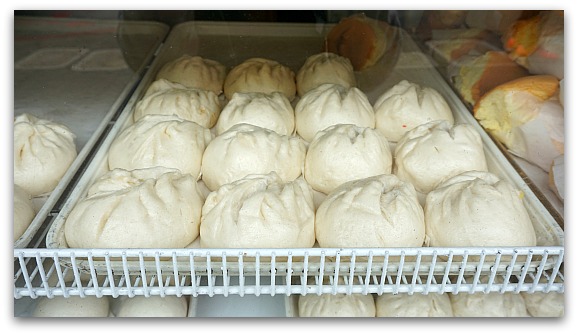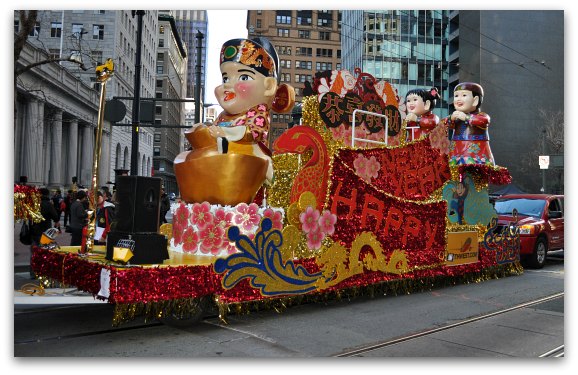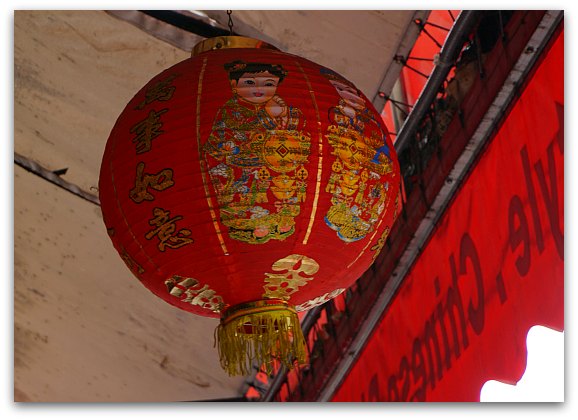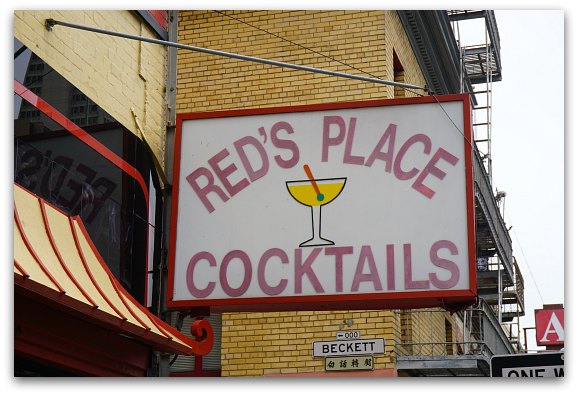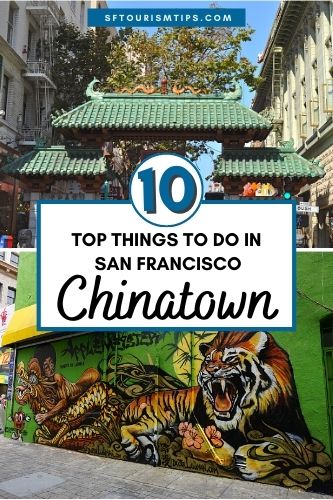SIGN UP FOR MY EMAIL TO RECEIVE YOUR FREE SAN FRANCISCO PLANNING GUIDE.
San Francisco Chinatown: Top Activities & Things to Do
By: Jill Loeffler • Updated: April 16, 2025
San Francisco Chinatown is a bustling neighborhood with a lot to see and do.
You can visit our famous fortune cookie factory, explore the district on one of our popular walking tours, or step inside a historic temple. You can also do some shopping or attend one of our colorful events or festivals.
Find my top tips for visiting this fascinating San Francisco district below.
Table of Contents
Feel free to skip ahead to the section that most interests you:
- 10 Things to Do in Chinatown
- Where to Eat in Chinatown
- Top Chinatown Events
- When is SF Chinatown Open?
- What to do at Night in Chinatown
- Where to Stay
- Where to Park
- How to Get to Chinatown
Where is Chinatown in San Francisco?
This district is centrally located in the heart of San Francisco's commercial area.
It is bordered by North Beach to the north, the Financial District to the east, Union Square to the south, and Nob Hill to the west.
Dragon's Gate is the famous starting point of Chinatown, found at the intersection of Bush Street and Grant Avenue.
Once you enter, you will be on Grant Avenue, the main drag in this SF district (up to Broadway/Columbus). Most of the restaurants and shops are right on this street.
There are a number of smaller shops and restaurants on the side streets, but the heart of this San Francisco neighborhood is along this corridor.
San Francisco Chinatown Map
On my San Francisco Chinatown map below, you'll see where this district is located in relation to the rest of the city. The boundaries are marked in red with the street names.
The cable car, bus, and light rail transit lines are also labeled with different colors. Several of my top 10 things to do in Chinatown are indicated with symbols (temples, museums, fortune cookie factory, churches, hotels, and parking).
SFTourismTips is made possible by readers like you! If you book through my links, I may earn a small commission at no extra cost to you. Thanks for your support! Learn more.
Top 10 Things to Do in Chinatown San Francisco
Wondering what to do in Chinatown, San Francisco? This district is full of fun activities, from seeing how fortune cookies are made to shopping for inexpensive souvenirs.
Here are the ten most important things to see and do in this neighborhood.
1. Enter at the Dragon's Gate
The Dragon's Gate is often the first stop for visitors to San Francisco Chinatown. This gorgeous structure separates the newer Union Square district from this historic neighborhood.
Make sure to spend a few minutes checking out its ornate details before you enter.
You can also get some great shots of it from across the street on Bush Street. Also, check out the amazing details on the dragon lamps all around the district.
2. Stop Into the Golden Gate Fortune Cookie Factory
One of your first stops in San Francisco Chinatown should be the Golden Gate Fortune Cookie Factory, where you'll watch as the cookies come hot off the press and the workers add fortunes to them.
Maybe you can even guess what your fortune will be before you open your cookie!
It only takes a few minutes and is a fun way to start your tour of this district. You will find it at 56 Ross Alley, which is off Jackson Street between Grant and Stockton Streets.
>> More tips to visit the Golden Gate Fortune Cookie Factory
3. Take a Tour
There is so much to learn about this neighborhood, from San Francisco Chinatown's history to its authentic foods.
Luckily, there are a number of walking tours to give you an insider's look at this fascinating SF neighborhood.
You'll learn more about its community, top attractions, and role as one of the first settlements in the area, even before San Francisco became a city.
Here are three of my favorite tours:
Food Walking Tour of Chinatown & North Beach: These two districts sit side by side, yet offer a completely different look and feel. On this San Francisco Chinatown tour, you will get an insider's look at both. You will sample pizza and dim sum, and visit the location where "The Godfather" was written. This 2-hour tour is usually offered mid-morning, noon, and early afternoon. Check for availability.
San Francisco Chinatown and North Beach Walking Tour: This day tour focuses on the history of these two districts. You will learn about the Beat Generation, attend a tea ceremony, and get small samples of Chinese pastries. This 4-hour tour runs daily at 10:30 am and 2:30 pm. See more details.
GPS Talking Tour Cars: Chinatown/Downtown Loop: A fun alternative to walking, these mini yellow GoCars seat two people and take you on a GPS-guided tour of the area. It's extra fun because you can zip in and around places big tour buses can't go. In addition to visiting San Francisco's Chinatown, this tour includes a drive through North Beach, Union Square, the Embarcadero to Oracle Park, and more. Learn more about this fun driving tour.
>> Find out more about these and other fun Chinatown tours
4. Go Bargain Hunting in SF Chinatown
San Francisco Chinatown is the number one place in the city to find inexpensive items.
There are great bargains on Grant Avenue, as well as a few other hidden spots around this SF district.
You will find everything from luggage to clothing to souvenirs. You will also find some great places for jewelry, traditional robes, and more.
Here are a few of my favorite places to shop in Chinatown, San Francisco:
Canton Bazaar: A large store with thousands of items. Primarily focused on clothing and accessories, but you will also find gifts, books, and home decor items. 616 Grant Avenue.
Peking Bazaar: Another one of my favorites in Chinatown SF. They focus mostly on discounted jewelry, home goods, gifts, and souvenirs. 826 Grant Avenue.
Bargains of Chinatown: This is a smaller shop, but also one of my go-tos. Inside, you will find some great deals on traditional Chinese clothing, shoes, fans, handbags, and some souvenirs. 512 Grant Avenue.
>> More tips on where to shop in Chinatown, plus off-the-beaten-path finds
5. Peruse the Chinese Historical Society
Visiting the Chinese Historical Society of America is a great way to learn more about the neighborhood.
This SF museum offers a look at the struggles of this community from the time they arrived in SF to the present day.
Here, you will see old photography, sculptures, and other pieces of work that showcase the real Chinatown in San Francisco.
Along with their unique permanent collection, they also have some interesting traveling exhibits that offer a detailed look at other events in SF's history and how they impacted this district.
The last time I visited, they had an incredible display about how Chinatown was affected during the 1906 Earthquake. You will find a new exhibit every few months.
The Chinese Historical Society is located at 965 Clay Street.
6. Visit Some Chinese Temples in the District
During your visit to the Chinatown neighborhood, I recommend spending a few minutes in one of the temples. Many welcome visitors and are open every day of the week.
Here are my top three picks (also marked on my Chinatown SF map):
- Kong Chow Temple at 855 Stockton Street
- Tin How Temple at 125 Waverly Place
- Ma Tsu Temple at 30 Beckett Street
>> Learn distinguishing details of each one and some tips for visiting
7. Discover SF Chinatown's Colorful Murals
One of the best things to do in Chinatown, San Francisco, is to admire this district's colorful murals.
In the past decade, this neighborhood has seen an explosion of colorful artwork popping up on its buildings.
You will find scenes depicting SF Chinatown's history and famous celebrations. They bring even more color to this district's already lively streets.
Here is where you will find some of my favorites:
Grant & Sacramento: There are two murals here that I love. My favorite is the colorful dragon mural with "Chinatown" across the top (image above). It's in the building that houses the Bargain Bazaar.
Grant & Clay: You will find several murals at this corner. They are above the Jing Ying Gift Shop and down Clay Street on both sides.
Hang An Alley at Clay Street: There are a few really cool mosaics just inside the Hang An Alley at Clay Street.
Make sure to keep your eyes out for other murals, too. More are popping up every day, and others are disappearing. It's an evolving set of street art, which makes it fun to find and photograph.
>> Find additional street art throughout SF
8. Immerse Yourself in the Community's Outdoor Parks
Another one of my favorite things to do in Chinatown, San Francisco, is to hang out with the locals. Especially on a nice day out, these two parks are delightful places to sit back, relax, and people watch.
Portsmouth Square: Central to this district, this was where the town of San Francisco was initially founded. Now known as the "Heart of Chinatown," it still honors its role in California history with statues and markers.
Furthermore, it serves as a community gathering place where the locals regularly meet to play mahjong, hold tai chi classes, and more. There are also playgrounds and restrooms here.
Located on Kearny Street between Washington and Clay.
Willie "Woo Woo" Wong Playground: Just a couple of blocks west of Portsmouth Square, you'll find this park named after the Chinatown native USF basketball star.
The eye-catching playground features outdoor play structures modeled after Chinese mythology, including a massive, climbable Water Dragon. Many come here to use the clubhouse and sports facilities.
Head over to Sacramento Street between Stockton and Grant Avenue.
9. Learn Some History at the WWII Pacific War Memorial Hall
The WWII Pacific War Memorial Hall is a hidden gem in San Francisco's Chinatown. This history museum offers an in-depth look at China's role in WWII.
The exhibits will take you through the history of their entry into the war and what happened after that. It includes exhibits with artifacts, photos, and documents from the war.
All exhibits offer explanations in both Mandarin Chinese and English.
You will find this small history museum at 809 Sacramento Street. Open Wednesday through Sunday from 10 am to 4 pm.
10. Admire Two Beautiful SF Chinatown Churches
Old Saint Mary's Cathedral
This historic Catholic church was California's first church built specifically to be a cathedral.
Built in 1854, this church survived the 1906 Earthquake. However, it was severely damaged in the following days by the fires ravaging SF. It was rebuilt and reopened in 1909.
This Catholic church welcomes diversity and is a big part of the Chinatown community. You can step inside for a visit or come for one of their daily masses.
It's a quick stop, but a fun place to visit. You will find it at 660 California Street at Grant Avenue.
Notre Dame Des Victoires Church
This is another gorgeous church in Chinatown, and you are welcome to step inside whenever the doors are unlocked. They also offer two daily masses.
My favorite part of Notre Dame is its stained-glass windows. It's also less popular than Old St. Mary's, so it isn't as busy or crowded.
This one is at 566 Bush Street, just a block from the Dragon's Gate.
Both of these historic churches are marked on my SF Chinatown map with a purple cross.
Where to Eat in San Francisco Chinatown
There are so many places to eat delicious food here that it's hard to say which are San Francisco Chinatown's best restaurants. But of course I have my favorite places.
Options include local bakeries where you can sample a variety of pastries, dim sum (a variety of small dumplings and dishes with different fillings), and traditional Chinese restaurants with stir-fried dishes.
Here are some of my favorite San Francisco Chinatown restaurants:
Hang Ah Dim Sum Tea House: This is my favorite place to eat in Chinatown SF. Not only is the food delicious, but they have a wonderful atmosphere. The locals who run it are a joy to chat with, and they will point you in the right direction if you aren't sure what to try. Make sure you also leave room for dessert! It is located at 1 Pagoda Place, just off Sacramento Street near the Willie "Woo Woo" Wong Playground.
Hong Kong Clay Pot Restaurant: This fun restaurant offers most of its dishes in clay pots. The clay pot dishes are soaked in water for cooking, and you will find a great selection of items on their menu. It is at 960 Grant Avenue near Jackson Street.
House of Nanking: By far the most famous restaurant in Chinatown, San Francisco is the House of Nanking. Two of my favorites here are their fried onion cakes and their sesame chicken. You will often find a line outside, so plan for a wait or visit during their less busy hours in the middle of the afternoon. You can't miss its colorful sign hanging off the building at 919 Kearny Street.
>> Find 10 additional dim sum restaurants in Chinatown and SF
Top Annual Events in Chinatown
Still wondering what to do in Chinatown, San Francisco? If you're lucky, you'll be in town when the lively neighborhood hosts one of its large annual events. Here are some of the most popular ones:
Chinese New Year Festival & Parade
Chinese New Year is the biggest celebration in Chinatown SF every year. It kicks off with a large parade through downtown and the district's center. The date changes every year to coincide with the lunar cycle. It will fall sometime between late January and early March.
It's a fantastic celebration with music, colorful costumes, fireworks, and thousands of people. If you happen to be in San Francisco during this time of year, I highly recommend participating in this celebration.
>> Learn more about this year's Chinese New Year event
Hungry Ghost Festival
Each year, the Chinese Culture Center of San Francisco honors a tradition that seeks to appease and distract restless spirits that appear in the human realm on the 15th day of the 7th lunar month.
This free family-friendly gathering features a "Ghost King Parade," Chinese food, music, art, cultural performances, and more.
The event is usually held on an evening in August at Rose Pak Station.
>> Visit their website for more info
Chinatown Autumn Moon Festival
A big event each year in the fall is the Chinatown Autumn Moon Festival. The event celebrates the full moon in September or early October. It's always the 15th day of the lunar calendar's 8th month.
This tradition started shortly after the 1989 Earthquake as a way to revitalize and add life back into this district and SF.
Ongoing Event: Chinatown Night Market
If you are in town on the second Friday of the month, you won't want to miss our lively Chinatown Night Market.
Since 2023, this monthly tradition has been drawing thousands of attendees to the district to explore Chinatown's diverse sights, sounds, aromas, and tastes on a night when everyone flocks to the brightly lit streets.
Dozens of local businesses participate, inviting guests to try Chinese delicacies, learn calligraphy, watch cultural performances, and more.
The event takes place on Grant Avenue between Jackson and Sacramento, beginning at 5:30 pm every second Friday. (I marked this area with fair banners on the map.)
If you only have one day in Chinatown, then check out my "Perfect Day" itinerary. In just one day, you will learn about this district's history, check out some great places to eat, and find the best places to shop. It's a fun way to cover as much as possible in one day, but at your own pace!
When Is San Francisco's Chinatown Open?
I'm often asked about Chinatown San Francisco's opening hours. What time does Chinatown open? What time does Chinatown close?
The district is always open, and you are welcome to walk through it at any time of the day or night.
All of the stores, restaurants, and businesses within the district are independently owned and operated, so you will find that Chinatown SF hours vary.
Most stores open around 10 am. They often stay open until around 7 or 8 pm. Almost all of the shops are open 7 days a week.
San Francisco Chinatown restaurants often have extended hours, typically from around 10:30 or 11 am until around 8 pm. Some bakeries and cafes operate from as early as 6 am to mid-afternoon.
Most restaurants are open daily, although some are closed on Mondays or have shortened hours on Tuesdays.
You will find Chinatown San Francisco is open on major holidays, including Thanksgiving, Christmas, and New Year's.
Some places may have special holiday hours, but you will find quite a few places open during these times.
What to Do at Night in Chinatown
You will find that most of the activities in Chinatown, San Francisco are during the day. However, you will find a few things to do at night, too.
Shopping: As I mentioned above, you can head over here in the evenings for some shopping. You will find plenty of places open until around 10 pm.
Dinner: Many of the restaurants are also open until 8 or 9 pm at night. They include traditional Chinese restaurants as well as those with tasty dim sum.
Night Walking Tours: You will also find some fun night walking tours around this district. Some are ghost walking tours, and others are food tours.
Bars in Chinatown: There are a couple of bars in this district that I love to frequent, too.
My three favorites are:
- The Buddha Lounge (cash only, dive bar with a diverse crowd) 901 Grant Avenue
- Li Po Cocktail Lounge (yummy Chinese mai tais) 916 Grant Avenue
- Red's Place Cocktails (oldest bar in Chinatown, serving draft beers in a low-key environment) 672 Jackson Street
>> Additional nightlife options around SF
Did you know? Tragedy is woven into the history of our lively but mysterious Chinatown district, from the brothels of the Gold Rush days to the Golden Dragon massacre of the 1970s. Find out more about this hour-long ghost tour.
Where to Stay Near Chinatown
With Chinatown's location in the heart of the city, it is easy to find a great hotel nearby. Here are some of my top recommendations.
Orchard Garden Hotel
Address: 466 Bush Street
This 4-star hotel near SF Chinatown has 86 rooms and the following amenities:
- Fitness & business centers
- Suites available
- Free Wi-Fi
- Room service
- On-site restaurant for breakfast
- Rooftop garden and patio
Rooms at the Orchard Garden Hotel start as low as $139 a night.
>> Find more ratings and reviews for the Orchard Garden Hotel
SW Hotel
Address: 615 Broadway Street
The SW Hotel is a 3-star hotel with 81 rooms. It has the following amenities:
- Free Wi-Fi
- Custom-designed furniture with modern Asian accents
- Cable TV
- Air conditioning
- Refrigerator
Rooms at the SW Hotel start as low as $139 a night.
>> Find additional ratings and reviews to book your stay at SW Hotel
Other Hotels in San Francisco Chinatown
Royal Pacific Motor Inn: 661 Broadway Street, 2 stars
- Free parking, free Wi-Fi, air conditioning, laundry service
- Rooms start at around $103 a night (book here)
University Club: 800 Powell Street, 4 stars
- Free Wi-Fi, continental breakfast included, flat-screen TV and coffee maker in room, restaurant/bar, on-site gym and sauna, business center with meeting rooms
- Rooms start at around $155 a night (book here)
Find ratings, reviews, and great prices: San Francisco's Chinatown Hotels
>> Discover my other lodging recommendations in San Francisco
Is Chinatown in San Francisco Safe?
Is San Francisco Chinatown safe? This is another question that I get quite often.
This district is more compact and crowded than most of the other SF districts. Even though it feels like there are people all around you, it's perfectly safe.
However, as in other crowded areas, you will want to keep an eye on your belongings. I have yet to hear of very many issues here, but purse and wallet theft is common in busier areas.
I walk around Chinatown in San Francisco quite often, and I would say feel free to explore all of it.
Enjoy its wonderful parks, walk down its less-visited alleys, and know that there is little chance of something happening to you while you are here.
Where to Park in San Francisco Chinatown
The small, narrow streets of Chinatown in San Francisco make street parking a hassle. There are meters for street parking, but it can be difficult to find a spot and navigate the busy streets and sidewalks.
So, it's best to try to find a spot in a nearby parking lot or garage.
Here are a few that are within walking distance and usually have plenty of space (these are marked with a P on my SF Chinatown map):
555 Jackson Street: This is a great indoor garage for those visiting either Chinatown or North Beach, as it sits right between these two districts. It has many spaces and is best suited for small and medium-sized cars. Rates start at around $2.50 for 20 minutes, $7.50 for an hour, with a $28 daily maximum.
433 Kearny Street: This large above-ground parking garage is in St. Mary's Square. It will give you easy access to SF Chinatown as well as the Financial and downtown districts. It has more than 400 spots with rates running from $3 to $7 an hour, depending on the time of entry. It's open 24 hours a day, with a daily maximum of around $45.
444 Stockton Street: Right outside the Dragon's Gate is one of the largest parking structures in San Francisco. The Sutter-Stockton Garage has more than 1,800 spaces and is great for cars of all sizes. Rates are $4 to $5 an hour, depending on when you enter, and might be more on event days. The daily maximum is $44.
728 Pacific Avenue: This is the official Chinatown parking garage. I've listed it last because it's a tight fit, but they usually have room for cars. It's located on the district's northern end and is less expensive than the other options on my list. However, they are not open 24 hours a day, so make sure to check the hours to confirm that you will be leaving before they close. Hours are typically 7 am to 8 pm.
Note: Parking rates are subject to change at any time, so plan ahead.
>> Find additional parking around SF
How to Get to Chinatown
There are numerous transportation options to get to San Francisco's Chinatown. See the map for more details.
From Fisherman's Wharf or Pier 39:
- Cable Cars: You can take either the Powell-Hyde or the Powell-Mason cable car lines from Fisherman's Wharf to San Francisco's Chinatown. It will take you about 20 minutes on either line. The cost is $8 for a one-way ride.
- Bus #30 or #8: From the western end of Fisherman's Wharf, you can pick up the 30 Muni bus at Columbus and Bay Streets, get off on Stockton at Pacific or Washington Street, and walk up the hill until you reach Grant Avenue. From Pier 39 on the eastern side of Fisherman's Wharf, you can catch the 8 bus at North Point and Kearny or North Point and Stockton, which will also take you down Stockton to Chinatown. The cost is $3 per person.
- SF Taxi: You could always take a taxi over to Chinatown. It will cost around $15 and only take about 5 to 10 minutes.
From Downtown:
- Cable Cars: All three cable car lines run from downtown through San Francisco's Chinatown. You can pick up either the Powell-Hyde or Powell-Mason line at the corner of Union Square and head north on Powell. If you are coming from the Embarcadero, you could pick up the California line going west and get off at Stockton Street.
- Muni T Light Rail: A convenient option is to take the underground T metro line. Just find the entrance at Geary and Stockton, hop on the northbound train, and take it to the next stop at the Chinatown Rose Pak Station. It will only take a few minutes, and cost about $3.
- Taxi: Since Chinatown is adjacent to the Union Square and Financial Districts, taking a taxi will take just minutes and probably cost less than $15.
- Walk: Coming from downtown on foot is a bit of an uphill walk, but if you take it slow, you can walk here easily. It's less than a mile.
From BART
How do you get from BART to San Francisco Chinatown? You have a few options.
I recommend jumping off at the Montgomery Street Station. Depending on which exit you take, you will find yourself about 4 to 5 blocks away from the Dragon's Gate (the main entrance).
From here, you can either walk to SF Chinatown—which is my preference—or you can walk to the corner of Kearny and Geary and take the 30 bus to Stockton Street.
San Francisco Chinatown History
You may not know this, but Chinatown in San Francisco is the oldest Chinatown in North America. It's also the largest outside of Asia. It is known as the "city within a city" and is SF's most densely populated area.
Like much of the city, Chinatown SF has its origins in the Gold Rush days. By 1850, news reached China of gold and opportunity in the "Land of the Golden Sun" and brought the first wave of Chinese immigrants to San Francisco.
The Chinese were known for their work ethic. They were a major force in building the California railroads, and they opened successful businesses in laundry, restaurants, fishing, and manufacturing.
When San Francisco was first founded as a frontier town in 1846, Portsmouth Square was the epicenter. As the town became more populated, the Chinese began to locate their businesses around it, and by 1853, the area was given the name “Chinatown” by the press.
The Chinese were so successful that they soon became seen as a threat by white Americans. Not only were their stores targeted with looting and burning, but they also faced new anti-Chinese legislation.
Did you know? As the only ethnic group in the history of the US to have been specifically denied entrance into the country with the Chinese Exclusion Act (1882 to 1943), Chinese immigrants were first detained at Angel Island in the SF Bay before either being admitted or sent back. Today, you can visit the fascinating and scenic island to learn more.
After the great earthquake and fire of 1906 destroyed Chinatown—and the city's immigration records—many Chinese men claimed citizenship and began to bring their wives and children (previously, the ratio of men to women had been 20 to 1).
Chinatown was rebuilt from the ashes with such fervor that its new, flamboyantly “Oriental” design became the tourist attraction that it is today.
Other Places to Visit in SF
Fisherman's Wharf & Pier 39: A trip to San Francisco is not complete without a stroll through Fisherman's Wharf and Pier 39. Yes, these areas are fairly touristy, but they are full of action and are in a beautiful location right along the San Francisco Bay. Discover the hot spots in this popular San Francisco neighborhood.
Union Square Shopping: Are you looking for a great place to shop? If so, a trip to Union Square is the answer. This lively neighborhood is full of high-end shops, galleries, and other fun stores. The square itself is a great place to grab some coffee and watch the crowds roll by.
Haight-Ashbury District: The Haight-Ashbury District takes you back to the 1960s. This was the heart of the action during SF's famous "Summer of Love." See where it all took place by strolling down this colorful neighborhood in San Francisco.
North Beach: Another popular San Francisco neighborhood is North Beach. The main attractions here are the great Italian restaurants, Coit Tower, and the cute shops that line the sidewalks of Columbus Street. It is packed with history, too. Learn more about this exciting neighborhood and everything there is to see and do!
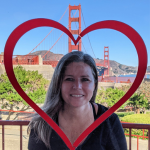
Hi, I’m Jill!
I’ve been sharing San Francisco travel advice since 2009 and have helped millions of people explore the city like a local. Whether you’re dreaming of sea lions, cable cars, or a great sourdough bread bowl, I’m here to help you plan an unforgettable trip with real tips from someone who actually lives here.
Comments? Questions? Suggestions?
I would love for you to join me in my private Facebook group!
It's a great place to interact with me and others who are familiar with the area.
You can ask questions, get advice for your upcoming stay, and then share your photos and advice with others when you return home. It's a great community and the fastest way to get answers to those nagging questions about your visit!
